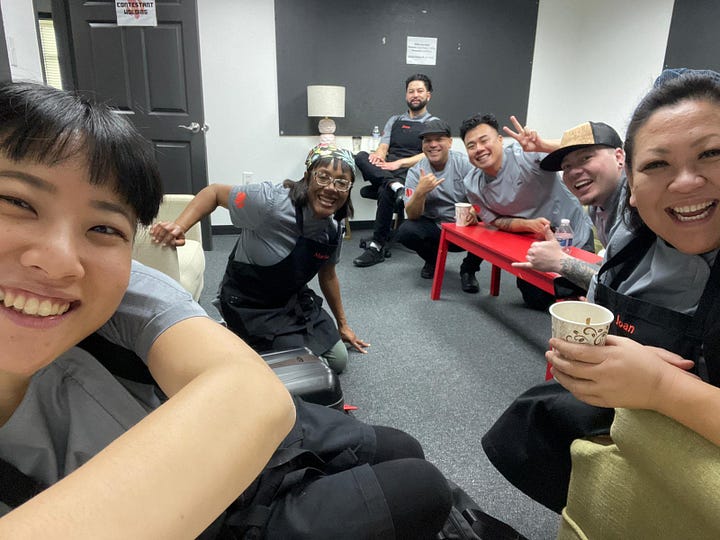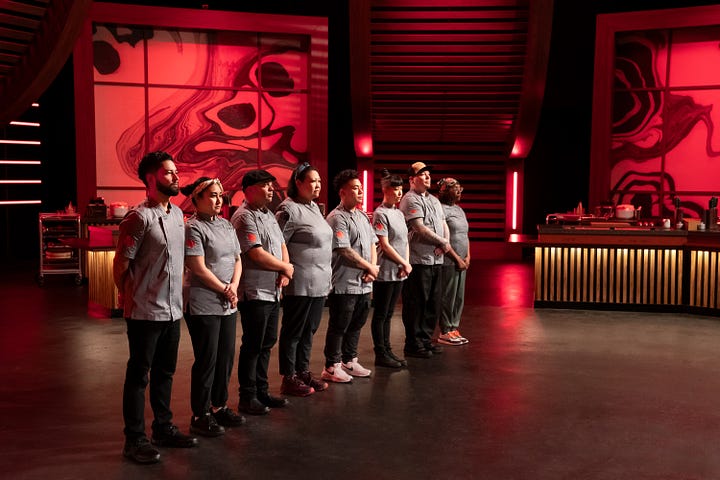Before we met Morimoto, we met each other.
It was uncomfortably quiet with the kind of nervous energy that comes from too much coffee and too little sleep. I had the feeling it was planned that way to let us stew together in that room to build the tension and drama. Eight strangers, clutching our knife bags, sizing each other up. Each of us there for the same reason: to become Morimoto’s Sushi Master.
At first, we mostly kept to ourselves. But curiosity has a way of cutting through silence, doesn’t it? We started talking about our backgrounds: chef-owners, author, executive chefs, people who grew up in the family sushi business. It was all impressive. So impressive that phones came out to size up Instagram accounts. Then, the knives came out. Someone suggested we show which knives and tools we had brought. One by one, we unrolled our bags and with them our stories. Laid out on the table in front of us, each set of knives was beautiful, worn, and deeply special.
That’s when the mood shifted. It got…friendly. And shortly thereafter, it got funny. Really funny. I don’t remember who made the first joke (Smootchie-san, was it you?) but I do remember the moment a curious production assistant checked in, genuinely confused.
"What’s so funny?”
It was nothing we could explain, because you kind of had to be there. And maybe you kind of had to be us to fully grasp it.
Even though we had loosened up, the nerves came rushing back when we were told it was time to officially begin. You could practically hear the energy shift again — excitement, anxiety, adrenaline, all rolled together.
Inside my chef’s coat, my heart pounded. Out of nowhere, I blurted out, “Y’all wanna try something?”
They looked at me, curious but wary. “Try what?”
I just smiled. “You just have to roll with it.”
Somehow, maybe because we were already halfway to being a close-knit group, they joined in. We stood together in a loose circle, and I launched into a silly preschool song I hadn’t thought about in decades, complete with hand motions.
We sang. We laughed. It didn’t erase the nerves or change what was ahead. But it did something better: it reminded us that whatever came next, we weren’t stepping into it alone.


From there, we entered the competition space with joy, not just adrenaline. We bonded over humor, inside jokes, and ridiculous nicknames. (Here’s looking at you, Kewpie Pie.) It made what seemed like endless waiting, whether heavy with nerves or light with laughter, feel a lot less lonely.
Competition looks glamorous under the lights, but it’s brutal in ways you don't always see. The judges' comments could slice deep. There were mistakes we couldn’t take back, moments of private disappointment, and the raw vulnerability of putting our hard-earned reputations on the line knowing one day they’d be out there, instantly and permanently. But what carried us through were the ways we showed up for each other: a kind nod, a quick word, a hand on the shoulder. When victories came, the celebrations you saw on camera were real. And so were the tears.
In a place that could have felt isolating, we chose to lift each other up. And it made all the difference because friendship didn’t dull the competition. It sharpened it. Pushing yourself feels different when you're surrounded by people you admire.





For me, the real story of this competition wasn’t in the challenges or the plates we put in front of the judges. It was behind the scenes in the quiet ways we built a community out of a contest. That was the real prize none of us saw coming.
And in case you’re wondering, those bonds didn’t end when the cameras stopped rolling. Tilapia Bread is still alive and well. (Sorry, you had to be there!)





From strangers to friends, and from competition to community—what an incredible journey to share and cherish!